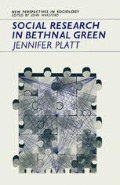Abstract
The Institute of Community Studies is a phenomenon. It started on a modest scale in 1954, and in the fifteen years since then has produced a continuous flow of books and papers and policy suggestions; its work has become probably more widely known in Britain than that of any other social research institute, though judgements of its value have varied considerably. Some of its books seem to have influenced the whole outlook of many young people, and I suspect that the general reading public’s conception of sociology is based largely on this body of work; academic sociologists, however, have often not been happy to accept this identification. It seems an appropriate time at which to attempt a full-scale evaluation of the work of what is by now an established institution, and to see if the conflicting opinions held of it can be reconciled, or if they rest on divergent standards and interests.
Preview
Unable to display preview. Download preview PDF.
Notes
Michael Young and Peter Willmott, ‘Research Report No. 3: Institute of Community Studies, Bethnal Green’, in ’Sociological Review’, ix (July 1961) 203–13.
Colin Rosser and Christopher Harris, ‘The Family and Social Change: A Study of Family and Kinship in a South Wales Town’ (Routledge & Kegan Paul, 1965).
Author information
Authors and Affiliations
Copyright information
© 1971 Jennifer Platt
About this chapter
Cite this chapter
Platt, J. (1971). Introduction. In: Social Research in Bethnal Green. New Perspectives in Sociology. Palgrave, London. https://doi.org/10.1007/978-1-349-00690-8_1
Download citation
DOI: https://doi.org/10.1007/978-1-349-00690-8_1
Publisher Name: Palgrave, London
Print ISBN: 978-1-349-00692-2
Online ISBN: 978-1-349-00690-8
eBook Packages: Palgrave Social & Cultural Studies CollectionSocial Sciences (R0)

